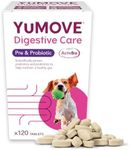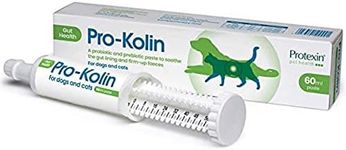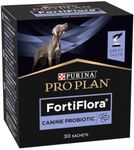Buying Guide for the Best Probiotics For Dogs
Choosing the right probiotics for your dog can significantly improve their digestive health, boost their immune system, and enhance their overall well-being. Probiotics are beneficial bacteria that help maintain a healthy balance in your dog's gut. When selecting a probiotic, it's important to consider several key factors to ensure you pick the best fit for your furry friend. Here are the key specifications to look out for and how to navigate them.Strain DiversityStrain diversity refers to the variety of different bacterial strains included in the probiotic. This is important because different strains offer different health benefits. Generally, a probiotic with multiple strains can provide a broader range of benefits. If your dog has specific health issues, look for strains known to address those concerns. For general health, a diverse mix is usually best.
CFU CountCFU stands for Colony Forming Units, which indicates the number of viable bacteria in the probiotic. This is important because a higher CFU count generally means more beneficial bacteria are available to support your dog's gut health. For everyday maintenance, a lower CFU count (1-5 billion) may be sufficient. For dogs with digestive issues or those recovering from illness, a higher CFU count (5-10 billion or more) might be more appropriate.
FormulationProbiotics for dogs come in various formulations, including powders, capsules, chews, and liquids. The formulation is important because it affects how easily you can administer the probiotic to your dog. Choose a formulation that fits your dog's preferences and your convenience. For example, if your dog is picky, a flavored chew might be the best option. If you prefer to mix it with food, a powder or liquid might be more suitable.
Additional IngredientsSome probiotics include additional ingredients like prebiotics, vitamins, or minerals. These can enhance the effectiveness of the probiotic and provide extra health benefits. However, it's important to ensure that these additional ingredients are safe and beneficial for your dog. If your dog has specific dietary needs or allergies, carefully check the ingredient list to avoid any potential issues.
Storage and Shelf LifeStorage and shelf life are important because probiotics contain live bacteria that can lose their effectiveness over time. Some probiotics require refrigeration, while others are shelf-stable. Choose a product that fits your storage capabilities and check the expiration date to ensure maximum potency. If you have limited refrigerator space, a shelf-stable option might be more convenient.
Veterinary RecommendationsVeterinary recommendations can provide valuable guidance when choosing a probiotic for your dog. This is important because veterinarians can offer insights based on your dog's specific health needs and medical history. Consult your vet to get personalized advice and to ensure the probiotic you choose is safe and effective for your dog.
















